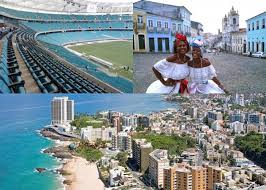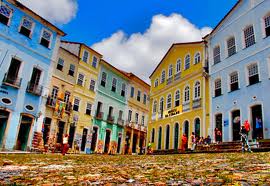Salvador de Bahia, Brazil, Seat of the 2014 FIFA World Cup
Salvador de Bahía, Brazil, Seat of the 2014 Football World Cup and Heritage Site by UNESCO is a beautiful and charismatic city.
It’s official name is São SaIvador da Bahia de Todos os Santos, in English: City of the Holy Saviour of the Bay of all Saints

Located on the Northeast is the third metropolis in population and the eighth in Latin America.
It has several universities, is an administrative and industrial center with a major international traffic at its port facilities.
The traveler can enjoy a particularly unusual tourism as it retains its traditions, architecture and history from colonial times, even not changed by modern life.
You can feel the nature around the city in a lush shared by its original inhabitants, inhabitants of a place that has left many traces in the history of the country.
So surely deserve more than a visit to tour the Upper Town or Administrative Centre which houses the first Cathedral and School of Medicine.
Then there is the Lower Town with its beautiful architecture and unique, so much so that its historic center was declared a Heritage Site by UNESCO in 1985.

This place, the Historical location of Pelourinho, used to be the part of the town were the slaves were kept. The Pelourinho beyond and Historical place, is since the 90′ the principal turism attraction and has the most of the local trade on it.
Its population consists mainly of descendants of the first settlers of the country, brought from Africa as slaves from the fifteen to sixteenth century by Portugal. With his martial dance called Capoeira, created as a way to maintain their traditions, art combines precise body movements with martial or combat fight, undercover in it.
It has more than three hundred and fifty churches, giving it the nickname Black Rome showing the important African influence. This is transmitted to his music on his popular samba, ax and more Afoxé spiritual, as much as his food.
Home to two major universities, the Federal University and State Univ., both public.
This does not diminish that were created many private universities and colleges in the 90s.
Also remember that Bahía is known for its exuberant celebrations during Carnival and major tourist destination, mainly the Pelourinho, and its rugged beaches.
Although there are places with very little influx of tourists that are beautiful paradises lost in nature, that will transport you to a dream, for sure.


